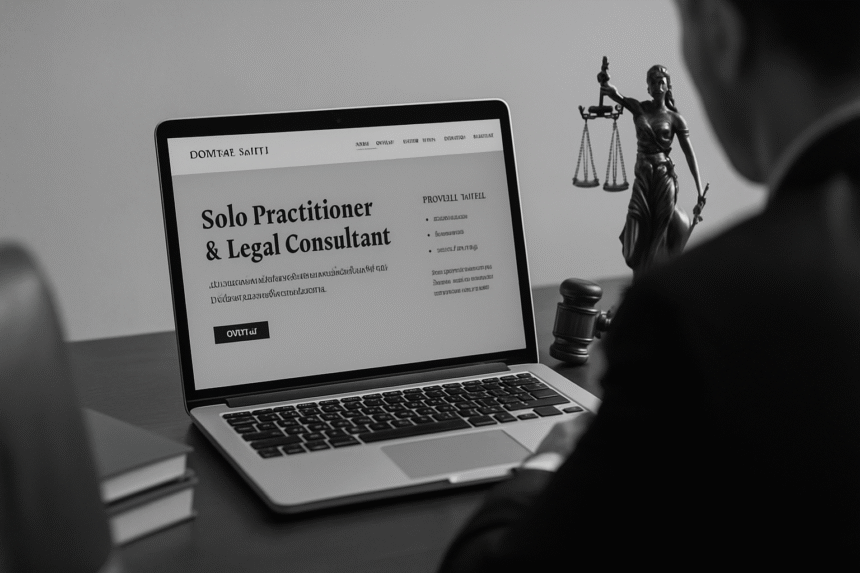Do I Need a Website for My Solo Legal Practice? (FAQ)
If you’re a solo lawyer or independent legal consultant, you’ve probably wondered: Do I really need a website? Between referrals, LinkedIn, and freelancing platforms, it can be unclear whether investing in a site is worth it.
This FAQ answers the most common questions solo legal professionals ask when deciding whether to build a website. From credibility and client intake to SEO and compliance, we’ll help you make an informed choice.
Q1: Is a website necessary to attract legal clients?
Not strictly—but it gives you a major advantage.
Referrals and freelancing platforms are great, but a website gives you a central hub that you control. It builds credibility, helps you rank on Google, and shows potential clients you’re serious.
Even a simple one-page site with your services, contact info, and credentials can make you more trustworthy.
Tip: Pair your website with a Google Business profile to boost visibility.
Q2: Can’t I just use LinkedIn instead of a website?
LinkedIn is useful, but it’s not a substitute.
Your website allows you to:
- Publish your own terms and legal disclaimers
- Host downloadable resources (like T&Cs or NDAs)
- Use your own branding and call-to-actions
LinkedIn is one platform. Your website is your digital office. It builds long-term authority and gives you independence.
Q3: What should a solo lawyer website include?
Keep it simple. Start with:
- A homepage with a clear message
- Services offered (with niche focus if possible)
- About you (credentials, experience, bar registration)
- A contact form or booking link
- Testimonials (if available)
Optional:
- Blog or legal insights
- Case study or example results
- Free legal checklists or templates
Legal tip: Always include disclaimers that the content is for information only—not legal advice.
Q4: Will a website help with SEO or Google ranking?
Yes—if you build it with SEO in mind.
Solo lawyers who use keywords like “startup contract lawyer in Dubai” or “family law attorney in Abu Dhabi” in their site copy can show up in local search results.
You don’t need to blog daily, but a few well-written pages and SEO titles can help.
Tool tip: Use plugins like Rank Math or Yoast to guide your SEO setup.
Q5: What legal or compliance issues should I watch out for?
Good question. Your website should:
- Include a privacy policy (especially if using contact forms)
- Display disclaimers (that browsing your site doesn’t form a lawyer-client relationship)
- Mention your jurisdiction clearly (to avoid misleading foreign clients)
- Avoid using logos of courts or bars unless allowed
Bonus: Add terms of use if you’re offering downloads.
Q6: How much does it cost to launch a basic legal website?
You can build a professional-looking site for $100–$300:
- Domain: $10–20/year
- Hosting: $5–15/month
- Theme + Builder (like Elementor or Squarespace): free or $50–100
Or hire a freelancer for $300–$800 to do it all.
Reminder: You don’t need a custom design. Focus on clear text, fast loading, and mobile-friendly layout.
Q7: Can I use my website to generate leads or automate intake?
Absolutely. Add:
- A lead magnet (e.g., “Free NDA Template for Freelancers”)
- A contact form or Calendly booking link
- A client intake form with required info
This saves time and helps pre-qualify clients.
You can even create landing pages for specific services like “Contract Review for Startups” or “Freelancer Terms in UAE.”
Q8: What if I’m too busy to write or update the site?
You don’t need to update it weekly. Focus on building a solid evergreen foundation.
- Homepage with clear intro
- 2–3 service pages
- 1 bio or “About” page
- 1 FAQ or blog page
That’s enough to show up professionally and answer common client questions. Updates can come later.
Bonus Tip: Don’t Wait Until You’re “Ready”
Many solo lawyers delay launching their site until they have the perfect design, portfolio, or client list.
Reality check: Start simple. You can update later. The sooner you’re visible, the sooner clients can find and trust you.
Final Thoughts + Call-to-Action
A website isn’t just for big firms—it’s your 24/7 assistant, resume, and brand platform rolled into one. It doesn’t have to be expensive or fancy. It just has to work.
Want help planning your solo law firm website? book a consultation to get started.



Leave a Reply